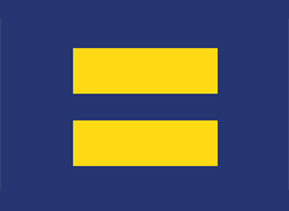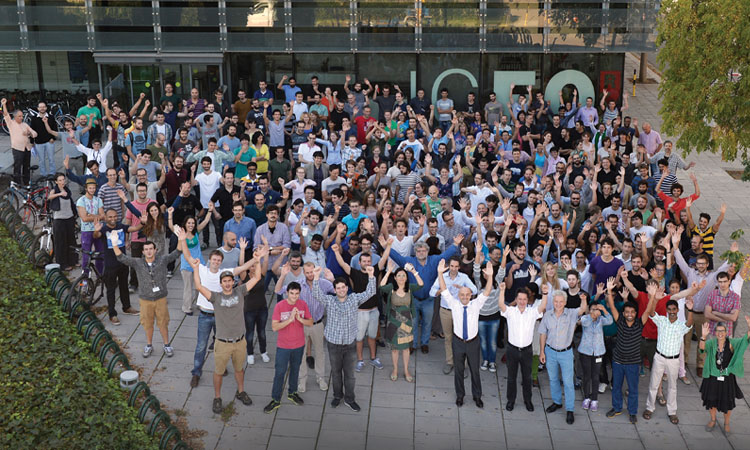 People of ICFO, photographed in 2014. [ICFO]
People of ICFO, photographed in 2014. [ICFO]
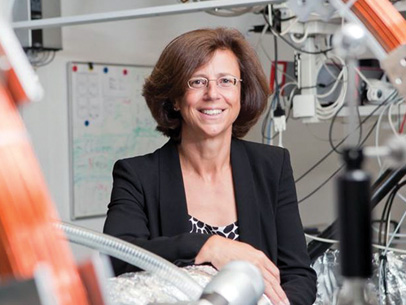 Ursula Keller [ETH Zurich / T. Kawara]
Ursula Keller [ETH Zurich / T. Kawara]
Having a support network—and in turn providing support for other women—is important, Keller says.
—Ursula Keller, ETH Zurich
Ursula Keller has achieved so much in her scientific career that it’s hard to imagine why anyone would have discouraged her from pursuing her work. A physics professor at ETH Zurich, Switzerland, she was elected to the US National Academy of Sciences in 2021, and in 2020 she won the Frederic Ives Medal/Jarus W. Quinn Prize from OSA (now Optica) and the Gold Medal from SPIE—both societies’ highest honors. In September 2022, she received the Swiss Science Prize Marcel Benoist, sometimes referred to as the “Swiss Nobel prize,” for her pioneering work in ultrafast lasers. But her numerous recognitions and stellar track record as a researcher hide the obstacles that she’s faced as a woman in science.
Keller says that getting pregnant with her first child made progressing at work particularly difficult. “Basically, my colleagues at the university assumed that I can’t do my job with kids,” she says. “They stopped [my] promotion to full professor.” She was eventually promoted and had a second child, but juggling two young children and a full-time researching and teaching job, with the earlier discouragement echoing in her head, pushed her to her limit. At that point, “I was close to giving up,” she says. “I had enough.”
 MIT’s Great Dome [O. Franken / Getty Images]
MIT’s Great Dome [O. Franken / Getty Images]
The “MIT Report”
It all began with a small group of women faculty in the school of science at the Massachusetts Institute of Technology (MIT), USA. Frustrated at being given less space and fewer resources than their male counterparts, in 1994, they authored a letter to the dean of science laying out their concerns regarding gender-based exclusion and bias.
The letter prompted the dean to assemble a committee to study the status of women faculty in the school of science. That committee, formed in 1995, and a subsequent one in 1997 collected not only data on the allocation of salaries, space and other resources but also the stories of female professors. The findings of the two committees were compiled into a report, and its summary was published in the MIT Faculty Newsletter in 1999.
The published summary, which came to be known as the “MIT Report,” documented that as of 1994, only 8% of MIT’s school of science faculty were women; that women faculty salaries, occupied space and resources were significantly less than those of male faculty; and that even tenured women professors felt marginalized and were excluded from decision-making roles.
The MIT Report sent a shock wave through the research community, especially to readers who were unaware of the differential treatment that female faculty members were receiving. Even to those who were experiencing the gender bias on a regular basis, the report proved the existence of system-wide discrimination. The report ultimately led MIT to launch concrete steps toward realizing gender equity at the school and other US institutions to acknowledge gender inequities.
Then, in 1999, she saw a new report published by the Massachusetts Institute of Technology (MIT), USA, entitled “A Study on the Status of Women Faculty in Science at MIT”. She says reading the research made her realize that she was facing discrimination that many other women in science also experienced, and she couldn’t overcome it just by working harder or publishing more high-impact papers.
Indeed, women continue to suffer from working in a system set up for men, and women aren’t the only group that experiences inequity. Members of other marginalized groups—whether based on factors such as disability status, sexuality, nationality, race or ethnicity—also encounter disadvantages in their scientific careers.
But what does a good workplace, equitable and welcoming to all, actually look like? With the frequent news stories about discrimination at work, it may seem that good work environments don’t exist. But they do. OPN talked with people from two optics and photonics companies and a research institution that offer intriguing examples for others in championing diversity, equity and inclusion (DEI).
Diversity at the core
Optica’s annual Diversity and Inclusion Advocacy Recognition honors members, companies or institutions that proactively work to promote DEI in the optics and photonics community. One of the 2021 awardees was the Institute of Photonic Sciences (ICFO), a research center in Barcelona, Spain, which was recognized “for their deliberate and intentional work to integrate equitable, transparent and inclusive policies and programs throughout their institution’s hiring, mentoring and technical programming.”
From the very beginning, diversity has been a core value of the institute, says Robert Sewell, a staff scientist and the head of academic affairs at ICFO. The founder and director, Lluis Torner, had a clear vision of what he wanted ICFO to be: a place where anyone from anywhere in the world and any walk of life could participate in top-level research. And now, thanks to that early vision, about 70% of the people who join ICFO come from outside of Spain, making the institute a very international place, according to Sewell.
ICFO’s strong suit is its gender-equity initiatives for students and early-career researchers, which aim to recruit more women into optics and photonics research. One example is its María Yzuel Program, which offers fellowships to female students who wish to do research internships or conduct their masters’ degree research in ICFO labs. The institute’s strong outreach team also works with local schools to give young women the opportunity to participate in research activities.
Lluis Torner had a clear vision of what he wanted ICFO to be: a place where anyone from anywhere in the world and any walk of life could participate in top-level research.
ICFO has been a part of multi-institute efforts as well. These include the Mothers of Science grant program run by the Barcelona Institute of Science and Technology, which addresses the gender gap in science leadership positions, and the Science by Women program led by the Women for Africa Foundation, which gives African women opportunities to conduct their research at cutting-edge institutions like ICFO.
Having a strong track record of advocating for gender equity doesn’t mean that ICFO cuts itself slack when it fails to meet its objectives, however. For example, when the institute noticed that the percentage of women in its postdoctoral training program had dropped, it immediately worked to rectify the gap by putting more fellowships in place, Sewell says.
This quick responsiveness to equality issues—and the ability to hold itself accountable for them—is possible because ICFO tracks several hard metrics related to selection and admissions processes, gender distributions at each level and salary information to ensure that the institute doesn’t have gender or salary disparities or systemic biases. And when the metrics start to diverge from concrete goals that ICFO has set, the institute revises its plan accordingly, notes Sewell.
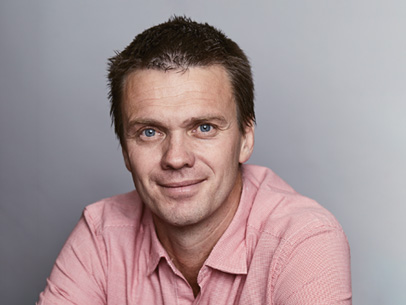 Robert Sewell [Courtesy of R. Sewell]
Robert Sewell [Courtesy of R. Sewell]
“When you promote diversity, you also promote better outcomes and better decision making.”
—Robert Sewell, ICFO
Wide-ranging perspectives
Sewell says that the reactions from the people at ICFO to the DEI initiatives have been very positive, especially those coming from younger generations. In fact, its student community is the most engaged demographic that has been pushing ICFO to expand its diversity efforts beyond gender. “The younger generation is very switched on about topics around diversity and inclusion across many different axes,” Sewell notes. Students often suggest new DEI topics that the institute should focus on, such as LGBTQ+ issues, and the institute, in response, looks for avenues to incorporate these ideas into its policies and practices.
On the other hand, some people have expressed concern that ICFO’s diversity initiatives were pulling resources away from its core objective, which is to pursue excellence in science. But, Sewell says, “I think that there’s strong evidence now that these [DEI and research] topics are not in conflict with one another, but actually work hand in hand.”
The real issue that he sees is people’s attention getting “saturated” by ongoing discussions of DEI issues. This happens, he thinks, because they keep hearing about the same problems without seeing a clear path forward to fix them. “And this is tricky, because, often, changes are slow, a little bit messy and not always visible” says Sewell. To combat this, ICFO has found it helpful to host speakers who can suggest concrete action items that worked in other places and discuss how those items could translate into the context of ICFO, he adds.
Even though most people have reacted positively to the DEI initiatives, running them still isn’t easy, especially at a very international place like ICFO. For example, discussing the topic of race could mean different things to people from different countries, Sewell notes. In his home country of Australia, discussions surrounding race generally center around its indigenous communities. But in the United Kingdom, where he did his Ph.D., talks about race may get tied to religion and become conversations about, for instance, providing safe prayer space for Muslims.
Having a community with diverse opinions and viewpoints could make the process of taking on DEI issues more complicated, but Sewell thinks it adds richness to the necessary discussions. This diversity makes ICFO a great place to work, he argues, precisely because it allows you to learn from others’ different perspectives and opinions.
The optics and photonics community needs to continue making an effort to include a wider variety of people in the field, Sewell asserts, because globally it is missing out on a huge pool of research talent. Many scientists lack access to high-tech laboratories, which can hinder them from participating in cutting-edge science. Having diverse participation is important because “even in fields like science, when you promote diversity, you also promote better outcomes and better decision making.”
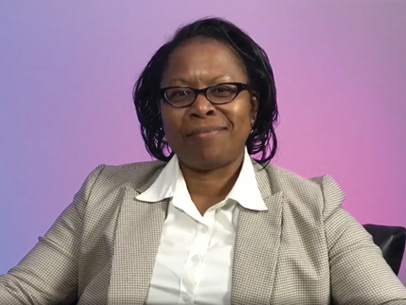 Chuwanda Thigpen [Lumentum]
Chuwanda Thigpen [Lumentum]
“We need to focus on people—who are responsible for ensuring that we are a successful business.”
—Chuwanda Thigpen, Lumentum
Focus on people
While ICFO had a clear vision for diversity from the start, Lumentum’s vision has grown and matured over time. A US-based optical components and systems firm, Lumentum was formed in 2015, when JDSU split into Viavi Solutions and Lumentum Holdings. As a new company, its early focus was on growing the business and becoming a market leader, says Chuwanda Thigpen, the company’s senior vice president of employee experience and chief diversity officer. But about three years ago, Lumentum realized that, while the early focus is still relevant, building a diverse and inclusive workforce is critical for its long-term success.
Since then, the company has focused more intentionally on diversity in its hiring, retention and promotion practices, including pay equity as a critical component. As part of the focus, Thigpen’s position at the company evolved into her current, unique role. Her job, as she explains it, is to ensure not only that every employee at Lumentum has a great work experience but also that the company has a diverse and inclusive culture for all employees throughout their careers.
Although many companies are realizing the importance of a diverse workforce, positions like Thigpen’s aren’t typical. She argues that as much as companies value innovation and transformation, they should value people, too. “We need to focus on people—who are, in fact, responsible for ensuring that we are a successful business.”
Lumentum’s focus on people and improving their experience with the company starts even before someone applies for a job. Thigpen says a lot of companies want to recruit a more diverse workforce—which is actually the easy part, she notes, because the talent is available. “The hard part is making sure that the culture is inclusive and welcoming when they get here, or they’re not going to stay”—which is why Lumentum’s integration efforts start as early as the recruitment stage.
Assessing and reassessing
When assessing the hiring process, Thigpen first asks herself, do Lumentum’s processes mirror the environment the company aims to build? Are interview panels diverse? Is the process inclusive? Is the offer competitive? How about relocation—does Lumentum’s relocation partner make the company’s new hire feel comfortable and welcomed? Even the onboarding process should be more than simply signing documents, Thigpen says. It is the first connection that a new employee has with the company, making it an integral part of building a strong relationship. While companies should work to integrate new hires into their corporate culture, they should also make an effort to learn from their new employees, since the new recruits were hired to bring something fresh and different, she argues.
Building a truly supportive work culture that touches on every aspect of an employee’s work life cannot easily be quantified. But that doesn’t mean that Thigpen thinks setting concrete goals is unnecessary—quite the opposite. Since deciding to focus on diversity, Lumentum has set goals, for example, to hire more early-career professionals and to have more women and members of underrepresented groups in leadership positions. Even for a subject like DEI, which can be difficult to quantify, “goal setting is paramount,” she says. “Otherwise, it’s just a discussion.”
So far, Lumentum has exceeded some goals while continuing to work on others. Thigpen points out that such goals are a part of the effort to become the best place to work. If the company hits a goal, it would continue to work beyond its target. And if the company doesn’t achieve its objective, for success the next time around, it goes back and assesses what could have been done differently.
If an organization is struggling to make changes, Thigpen suggests that the first thing to do is to take advantage of the many resources that are out there, such as the works of Josh Bersin, an analyst, author, educator and thought leader who focuses on global talent market. And if the scope of the problem seems overwhelming, she advises the company to focus on improving just one aspect of diversity. What may be viewed as a small step can be a monumental catalyst for change.
“It’s a journey,” Thigpen says. “The way things were isn’t the way things have to be.”
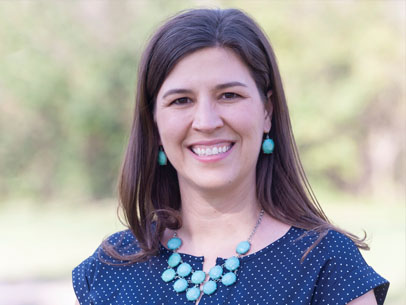 Danna Melcher [Courtesy of D. Melcher]
Danna Melcher [Courtesy of D. Melcher]
Melcher would say to other companies struggling with DEI efforts: “My advice is really just listen to the employees.”
—Danna Melcher, Fujitsu
Listen to employees
Along with ICFO, Fujitsu Network Communications (FNC), USA, also won Optica’s Diversity and Inclusion Advocacy Recognition in 2021—the first company to be honored in the award’s four-year history. FNC was recognized “for their investment in programs and initiatives celebrating and advancing Black, LGBTQ+ and women employees in pursuit of greater inclusion and equality within their company and the wider community.”
The key initiative that brought FNC this honor is its Employee Inclusion Networks, or EINs, which are employee-led, grassroots groups, says Danna Melcher, head of talent at Fujitsu Americas. One of the EINs is the Black Employee Inclusion Network Group (BEING), which was formed in reaction to the murder of George Floyd, an unarmed Black man, by police in Minneapolis, MN, USA, in May 2020.
This tragedy made employees realize that they needed a safe space to comfortably talk about the subject of race, says Veronica Lewis, senior human resources business partner at FNC and BEING’s chair. So taking advantage of the virtual environment that resulted from the COVID-19 pandemic, BEING was launched with participation from Fujitsu Americas’ US, Canadian and Caribbean employees.
In its almost two years of existence, BEING has held a variety of events, from watching a video that discusses racial trauma to celebrating Martin Luther King Jr. Day together to hosting a youth panel discussion. On its one-year anniversary, the group even threw a joint event with an Employee Resource Group at Verizon, which is FNC’s customer.
While the attendance at BEING events has been great, Lewis says it’s hard to quantify the group’s impact so far. But BEING’s goal is to affect people on an individual level with hopes of contributing to Fujitsu’s culture. “If one person walks away from the event, and they feel it was worth their time or they learned something … that, to me, is powerful.” Melcher echoes that sentiment, stating that connecting with other employees through these activities is itself beneficial and helps staff to better empathize with customers. In addition, BEING and other EINs can provide leadership opportunities to members who haven’t had a chance to take on those roles before, Melcher says.
Roadmap for LGBTQ+ workplace inclusion
Since 2002, the foundation arm of the Human Rights Campaign (HRC), an LGBTQ+ advocacy group based in the United States, has been publishing the results of its annual Corporate Equality Index (CEI)—a benchmarking tool to measure policies, practices and benefits relevant to LGBTQ+ employees.
Every year, the HRC foundation posts the rating criteria for the following year, which can then be used by willing corporations as a guide to improve their work environments. Based on the criteria, the foundation then analyzes the policies and benefits of participating companies and scores the corporations using a point-based system. The final report includes the names of the best workplaces for LGBTQ+ workers.
When the HRC foundation first started its CEI, only 13 of 319 participants achieved the top score. Now, in the index’s 20th-anniversary year, more than 1,200 corporations signed up for the 2022 CEI, and more than 800 of them scored 100, despite periodic updates to the foundation’s criteria.
The 2022 criteria fell under four central pillars, according to the HRC foundation’s website: non-discrimination policies across the business; equitable benefits for LGBTQ+ workers and their families; support for an inclusive culture; and corporate social responsibility.
One of those other EINs is the Women’s Innovative Network (WIN), which welcomes employees regardless of gender. Established in 2014, the group helps women achieve their full professional and personal potential by providing support and guidance. As if to show the group’s impact, the percentage of female employees in leadership positions at Fujitsu has been increasing steadily over time.
Forming and running the employee groups—and, from the company’s perspective, nurturing them—is no easy task. “There’s a lot of thought and extra effort that we have put into [these groups],” Melcher says. And putting in that extra effort is worth it from the company’s point of view because the EIN members help steer the company to the right direction. That is also what Melcher would say to other companies struggling with DEI efforts: “My advice is really just listen to the employees.”
And that is exactly what Fujitsu did to be listed as one of the top employers for LGBTQ+ equality. About three years ago, after a suggestion from another EIN named PRIDE, the company reviewed the Human Rights Campaign’s Corporate Equality Index criteria, which provide a roadmap for improving a workplace for LGBTQ+ employees. From there, Fujitsu decided to simply implement everything on the list, Melcher says, changing its policies to be more inclusive. It installed gender-neutral bathrooms. It made resources for transgender people highly visible, so they wouldn’t have to reveal their identities by asking for relevant information.
As a result, Fujitsu has had a perfect score on the Corporate Equality Index for three years in a row. The Human Rights Campaign changes the criteria periodically, which means that the company has to make new improvements every time there is an update. But instead of feeling daunted, Melcher believes the result is “a place where people can be completely themselves.”
It’s not just Melcher’s opinion—the company’s employees agree. When Fujitsu conducted a company-wide global brand survey a few years ago, employees from every region answered, “if you come work here, you’re going to get support no matter who you are.”
For an institution’s workplace environment to become more inclusive, governing by good leaders who support accountability and transparency is the key, Keller emphasizes.
Culture shift
Since Ursula Keller decided to speak up about what she calls the “women issue,” she’s developed her own opinion about how to improve working conditions for marginalized groups: cultural change with better governance. For an institution’s workplace environment to become more inclusive, governing by good leaders who support accountability and transparency—and a better grievance process—is the key, she emphasizes. Although such significant changes are an ongoing process, the organizations profiled above provide excellent examples of real cultural shift in action.
Thanks to the MIT report, Keller knows that she’s not struggling alone. She even has a group of other women professors that she often meets and shares her concerns with. Having that kind of support network—and in turn providing support for other women—is important, she says. She encourages women to seek out ways to help each other. Other members of marginalized groups could do the same.
Karen Kwon is OPN’s associate editor.

